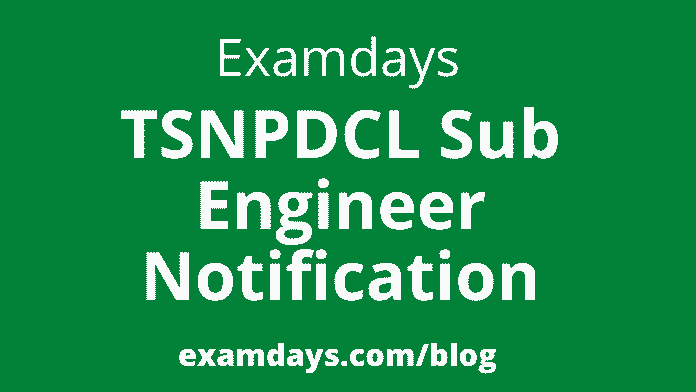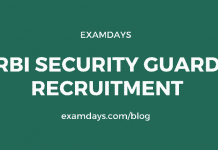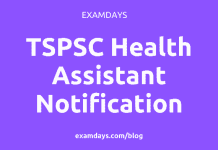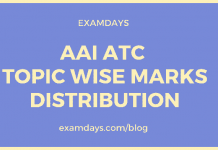
TSNPDCL Sub Engineer Notification 2023: The Northern Power Distribution Company of Telangana Limited (Telangana TSNPDCL 497 Sub-Engineer ) is inviting online applications from eligible candidates, who fulfilling vacancy posts criteria under Telangana TSNPDCL qualification eligibility, Age Limit, and other post related desired experience. Candidates can check the important factors about the TSNPDCL Sub Engineer Notification and recruitment process.
For TSNPDCL Sub Engineer Notification 2023, Candidates have to check the eligibility, age limit, online application fee, latest Telangana TSNPDCL 497 Sub-Engineer syllabus, selection criteria, number of selection stages, mode of selections, and Job posting locations with salary perks.
TSNPDCL Sub Engineer Notification 2023
| Name of the Authority | TSNPDCL Recruitment Board |
| Post Name | Sub Engineer Posts |
| Number of Posts | 500+ Vacancies |
| Qualification | Diploma |
| Age Limit | 18 to 44 years |
| Last Date of Apply | Available Soon |
| Selection Procedure | Written Test & Document Verification |
| Official Website | tsnpdcl.cgg.gov.in |
Telangana TSNPDCL 497 Sub-Engineer Vacancy Report
| Post Name | Vacancies | Age Limit | Scale Pay |
| Sub-Engineer (Electrical) | 497 * | 18 yrs. – 44 yrs. | 20535-865-23130- 1160-28930-1425-36055-1700-41155 |
EDUCATIONAL QUALIFICATION:
Must have a Diploma in Electrical Engineering (DEE) (or) Diploma in Electrical & Electronics
Engineering(DEEE) or Graduation in Electrical Engineering in addition to Diploma in ElectricalEngineering (or) Electrical & Electronics Engineering or any other equivalent qualification recognized by the Board/University of United Govt. of A.P./T.S/India/ UGC/DEC/AICTE.
CANDIDATE AGE
All eligible candidates must have Minimum 18 years and maximum 44 years. The age is reckoned as on 01.01.2023.
ONLINE APPLICATION FEE
Each applicant must pay Rs.100/- towards Online Application Processing Fee. This apart, the applicants have to pay Rs.120/- towards the Examination Fee. However, the Applicants belonging to SC/ST/BC Communities are exempted from payment of the examination fee.
TSNPDCL Notification 2023 Apply Online
- Before filling the application form, the candidate must pay the application fee first in online only http://tsnpdcl.cgg.gov.in
- Once online payment is done, upload the details including the Photo signature as per notification format.
- If you had any payment issues or application filling issues can dial below numbers.
- For any problems related to Online submission and downloading of Hall-Tickets please contact Help Desk No. 0870-2461501 (Call Time:10:30 A.M to 1:00 P.M & 2:00 P.M to 5:00 P.M) or logon to http://tsnpdcl.cgg.gov.in and click on to complaint box.
PROCEDURE FOR SELECTION
The selection of a candidate for appointment will be made 100% on written examination only. There will be no interview.
Sub Engineer Scale of Pay:
20535-865-23130-1160-28930-1425-36055-1700-41155
tsnpdcl sub engineer syllabus pdf
Section-A 80 Marks.
Diploma in Electrical Engineering.
- ELECTRICAL MACHINES:
TRANSFORMERS: Emf equation of single phase transformer, operation of transformer on load, equivalent circuit, vector diagram, open-circuit and short-circuit tests, voltage regulation, losses and efficiency, all-day efficiency, parallel operation of single-phase transformers with equal voltage ratios. Voltage and current relations for three-phase transformer connections. Principle of operation of auto-transformer. Cooling of power transformer, Operation of Buchholz’s relay.
D.C. GENERATORS AND MOTORS: Expression for emf equation of D.C.Generator, armature windings, armature reaction, types of generators, characteristics. Torque equation of D.C.Motor, characteristics, speed control, starters, losses and efficiency. Testing of D.C. Machines.
THREE-PHASE INDUCTION MOTORS: Constructional aspects of cage and wound rotor types of induction motors, expression for torque, torque-slip characteristics, full load torque, starting torque and maximum torque, effects of variation of rotor resistance; losses and efficiency; different starting methods; speed control methods.
SINGLE-PHASE INDUCTION MOTORS AND COMMUTATOR MOTORS:
Constructional features and operation of single-phase induction motors: split phase, capacitor and shaded pole types. Principle of operation of A.C. series motor, universal motor, Schrage motor.
- SWITCHGEAR AND PROTECTION:
FAULTS AND SWITCHING APPARATUS: Short-circuit calculations; fuses and isolators; circuit breakers: theory of arc interruption and different types of oil circuit breakers; lightning arresters and their selection and location.
PROTECTIVE RELAYING: Basic requirements of protective relaying, primary and back-up protection; classification of electromagnetic relays and their principles of operation; time current characteristic curves; induction type over-current relay, distance relays; Merz price protection, differential protection of transformers, bus bar protection.
- TRANSMISSION :
LINE CONDUCTORS, LINE SUPPORTS AND SAG CALCULATIONS: Different types of line conductors, conductor sizes commonly used for different voltage levels, Types of line supports, factors influencing the selection, cross-arms; spans, conductor spacings and ground clearances. Sag calculations and stringing charts.
TRANSMISSION LINE PARAMETERS: Determination of inductance and capacitance of round and parallel conductors in single phase and three-phase symmetrically spaced lines.
PERFORMANCE OF LINES: Choice of voltage; short, medium and long lines; calculation of sending-end voltage, regulation and efficiency for short lines; nominal and nominal-T methods; Ferranti effect; corona: critical voltages and factors affecting corona.
INSULATORS AND SUBSTATIONS: Different types of insulators: Pin type, strain type, suspension type and relative merits; voltage distribution across string of suspension insulators, string efficiency and methods of improving arcing horns. Equipment used in substations, bus-bar arrangements.
CABLE AND DISTRIBUTION SYSTEMS : Comparison between overhead lines and under ground cable. Types of cables, insulation resistance; localization of cable faults. Primary and secondary distribution; Feeders and service mains; radial and ring systems of distribution.
- MEASURING INSTRUMENTS AND ELECTRIC CIRCUITS:
MEASURING INSTRUMENTS: Indicating instruments: deflecting, controlling and
damping torques, pointers and scales; ammeters and voltmeters: moving coil, moving iron, dynamometer, induction types; instrument transformers: C.T and P.T., Wattmeters and measurement of power in three phase systems by two-wattmeter method; measurement of energy: Energy meters; M.D. indicators; trivector meter.
ELECTRIC CIRCUITS: Fundamentals of alternating current quantities, sinusoidal waveform; average and effective values; J-notation for A.C quantities; polar form; single phase series and parallel circuits; impedance triangle, phase, power factor. Active and reactive components of power; series and parallel resonance. Three-phase star and delta balanced systems.
- UTILIZATION OF ELECTRICAL ENERGY:
ELECTRIC DRIVES: Factors governing selection of motors; matching of motors with given loads; electric braking; rating of motor; types of enclosures; motors for particular drive.
ILLUMINATION: Definitions of commonly used terms and units; types of lamps; requirements of good lighting; laws of illumination; terms like : depreciation factor, utilization factor, waste light factor, luminous efficiency, specific energy consumption, space height ratio.
ELECTRIC HEATING AND WELDING: Requirements of good heating materials, materials generally employed, resistance heating; electric furnace; induction heating; dielectric heating welding generator and transformers.
Section-B: 20 Marks.
General Awareness and Numerical Ability :
- Analytical & Numerical Ability
- General Awareness
- English
- Related to Telangana Culture & Movement
- Computer Knowledge.
Join Examdays Telegram
For more details about the Telegram Group, Click the Join Telegram below button.
In case of any doubt regarding Telegram, you can mail us at [email protected].





Please intimate the sub engineering dates vacancies
Sure, we will try to follow it.
Tsnpdcl sub engineer notification release date and vacancies
These dates are available soon.
Tsnpdcl sub engineer notification release date and vacancies
Sure, we will update the notification and will initmate the same.